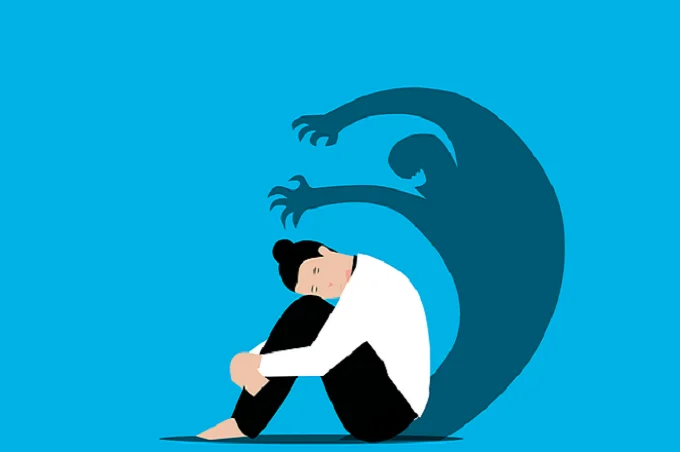What is fear and how to overcome fear

Fear is a common physiological response necessary for survival. But far from always, it is justified and reasonable. You can get rid of bad thoughts and drive away feelings of anxiety with the help of simple actions.
Everyone can conquer their fears. We have chosen the most effective tricks to help you overcome fear.
What is fear, and why does it occur

Fear is an idea that each individual at the level of senses understands. This is how the brain reacts to a stressful stimulus by releasing chemicals that increase heart rate, breathing rate, and muscle energization. The brain’s billions of nerve cells form a complex network of communications that is affected by a person’s feelings, thoughts, and actions. This is why “fight or flight” is often used to describe this response. What is the source of the fear response’s stimulus? Different factors might play a role: spiders or hostile passers-by, loud noises or frightening quiet – everything is different here. To get the latest stories, install our app here
The following physiological changes occur in the body in reaction to a fearful stimulus:
- Increased heart rate and blood pressure;
- pupils dilate;
- skin vessels narrow, and blood is actively directed to the main groups of tense motor muscles; increased glucose in the blood;
- smooth muscles of the lungs relax;
- non-essential system activity (digestion, immune defence) decreases;
- it becomes difficult to concentrate on small tasks (the brain focuses on the most important).
The term “fear” comprises a wide variety of bodily responses. It assists in dealing with harmful circumstances by preparing the body to escape or fight. As a result, fear is a necessary survival instinct.
The most common phobias that aren’t life-threatening may be rationally addressed and eliminated in today’s world. However, they may often turn into irrational phobias and panic attacks, far more difficult to manage. To get the latest stories, install our app here
Fear is a natural part of life, but you can and should overcome it so that it doesn’t get in the way of things like public speaking. It’s also important to understand the difference between rational and irrational worries and how to cope with them.
How to overcome fear

Fear is a natural emotion. Any competent person is terrified of anything new and unfamiliar, whether a random assignment from the boss or a career move. Self-doubt emerges, as does fear of making mistakes and the different problems that are daydreaming voluntarily generates, and self-esteem drops.
In such situations, one’s attitude toward fear dictates subsequent behaviour: sentiments either paralyze and prevent action, or they assist, driving one toward new information and results. To get the latest stories, install our app here
1. Feel your Fear
Fear will not disappear just because you ignore it. Accepting fear is the first step towards overcoming it. This will help to replace anxious thoughts with more rational ones. Don’t try to distract yourself. You can talk about your fear out loud or write it down on paper.
The main task is to focus on what scares you. When you try to ignore fear, it increases. Conversely, if you acknowledge it, the fear will decrease. Psychologists from the University of California have proven that discussing negative emotions helps overcome fear. They invited people who were afraid of spiders to touch a live tarantula. The more emotional the participant’s story was after the experiment, the sooner he got rid of his fear.
2. Explore the object of fear
Fear of the unknown is one of the strongest. Try to learn as much as you can about what scares you. For example, if you’re afraid of flying, compare accident statistics for different modes of transport, learn the basics of how an airplane works, and look at the meaning of certain sounds. Try to watch how many planes take off and land every minute in different parts of the world in real-time. It is also helpful to read the stories of people who were able to overcome the same fear as you.
Based on this knowledge, make a list of arguments confirming the groundlessness of your experiences. Next time, to calm down, you can turn to your “reserve of counterattacks” and operate with facts, not assumptions. To get the latest stories, install our app here
3. Let go of bad thoughts
When we are afraid of something, the imagination draws the most unpleasant scenarios. Try shifting your focus and replacing bad thoughts with positive ones. If you walk past a large growling dog, you don’t need to imagine how it breaks off the leash and charges at you. Instead, focus on the fact that the animal is tightly tied and cannot reach you.
At the same time, try to behave as naturally as possible. Imagine a situation that evokes pleasant memories for you. With this technique, you will send a powerful signal to the subconscious mind that its “excessive” emotional reaction is not required because nothing unusual happens.
4. Breathe deep
To quickly overcome fear and relieve anxiety, start breathing slowly and deeply. This will increase the flow of oxygen to the brain. Mentally count to seven as you inhale and eleven as you exhale. You can use other numbers; the main thing is to focus on the exhalation. It should be longer than the breath.
By controlling their breathing, a person controls the symptoms of anxiety. When you inhale, the nervous system is activated, and during exhalation, calm and relaxation occurs. Deep breathing also works if you only think about an upcoming event that causes fear. In addition, meditation, yoga, healthy sleep, a balanced diet, and walks in the fresh air help well in the fight against fear. To get the latest stories, install our app here
5. Ask questions
Fears can be based on childhood trauma, painful past experiences, or a rich imagination. Try to understand where your fear came from, what situations an attack begins, and its symptoms. This may be difficulty breathing, increased sweating, redness of the face, trembling.
Try to rate your fear on a scale of 1 to 10. Questions addressed to oneself help to cope with fear well. How real is the threat that scares you? What should you do to avoid unwanted developments? How bad can it be for you if the most unpleasant fears come true? The more you learn about your fear, the easier it will be to control and overcome it.

6. Think of a plan of action
Visualize your fear on paper. If you’re worried that it’s going to rain outside on your wedding day, write down the specific consequences that scare you. Unexpectedly, you may find that fear itself as an emotion is actually worse than anything you fear.
Most fears are irrational and unreasonable. They keep us in one place and force us to give up interesting opportunities. Think in advance of your plan of action if the fear comes true. Write down the specific steps you will take to adapt. Thus, gradually the fear will become less, and you will feel calmer and more confident. To get the latest stories, install our app here
7. Practice More
Gradual and repeated interaction with the object you are afraid of helps defeat fear. Fighting the fear of flying begins with ordinary trips to the airport. Then they move on to training on special simulators. The final stage is short flights. If the fear is related to a particular activity, the best way to get rid of it is to practice.
Those who are afraid of phone calls need to start calling more often. Try to sign up for a manicure and book tables in restaurants not through the site but by phone. If you are worried about the fear of public speaking, practice speaking in front of loved ones or in front of a mirror. Soon you will notice how the barriers that once held you back will begin to disappear. To get the latest stories, install our app here
8. Replace fear with a dream
When starting a new or difficult task, try not to focus on anxiety. Think about what the result will be what reward for success awaits in the future. Let this dream become a guiding star and lead you forward; it will become easier to cope with fears.
A person always has a choice – give in to fears and retreat, or befriend them and move forward. Do not try to eliminate fears from life; learn to control them, be aware of your reactions and deal with them. This will help make life brighter and easier.
9. Find a support group
Surround yourself with people who will help you overcome your fears. Swedish scientists from the Karolinska Institutet have proven that observing how your fear does not cause panic in other people is very useful. If you repeatedly watch someone doing what you fear, the fear may recede. The brain updates its knowledge of danger based on our perceptions.
It is useful for those who are afraid of heights to chat with a skydiver or a bungee jumper. They can talk about the positive emotions they experience while in the air. Sometimes friends can provide the support you need, even if they have no experience dealing with the fear that is bothering you. For example, children often do something scary just because they do it with friends who “push” them. To get the latest stories, install our app here
10. Believe in yourself
Even when it is very scary, the one who does not deviate from the goal is called a brave person. When you act despite fear, be sure to celebrate it and praise yourself. This is how the inner strength necessary to achieve goals develops. Recognize your weaknesses, but remember your strengths as well. Self-confidence helps to cope with fears and anxiety.
11. Contact a specialist
The methods described above effectively deal with only a mild form of fear. With a phobia, fear is strongly expressed, uncontrollable and not amenable to a full logical explanation. It leads to disadaptation and may be accompanied by nausea, dizziness, shortness of breath, fainting. If you can’t get rid of the obsessive state, work through the problem with a qualified specialist. We recommend contacting a psychologist, psychotherapist, or psychiatrist depending on the specific case.




